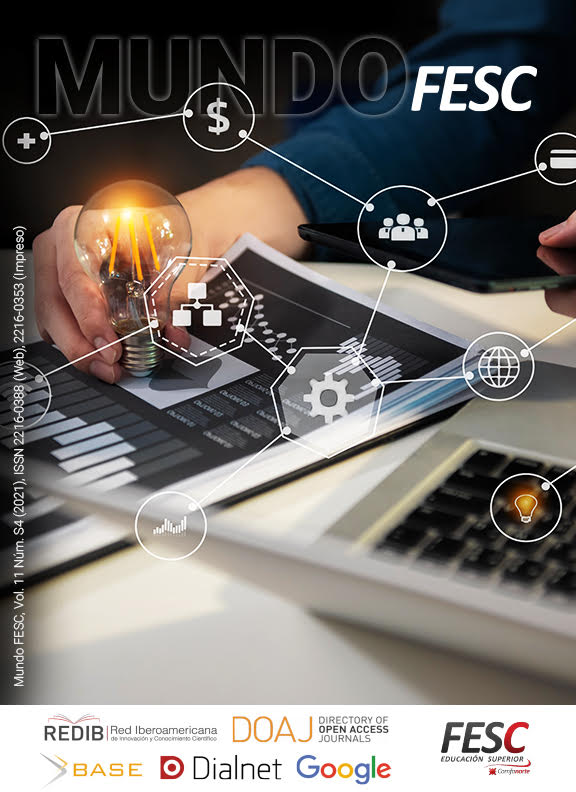Cooperative learning to strengthen the classroom environment and the teacher-student relationship
DOI:
https://doi.org/10.61799/2216-0388.935Keywords:
cooperative learning, classroom environment, pedagogical practice, team workAbstract
The teacher-student relationship is fundamental in teaching, it is a dynamic expressed in the student's attitude to learn and the teacher's attitude to exploit all the potential to learn, develop and grow in the student, despite their conditions; but this implies a deep knowledge of the being in the other. It is important that the teacher develops all possible strategies that are relevant to many factors such as the context, interests and learning styles of their students, favouring companionship, acceptance of differences and the capabilities of each student willing to work as a team; cooperative learning is a teaching and learning strategy that strengthens the classroom environment and the teacher-student relationship. The aim of the study is to identify the factors that influence the classroom environment, to develop didactic strategies framed in collaborative learning as an educational approach and to stimulate social cooperation. The work is framed in the qualitative paradigm with ethnomethodological approach giving importance to the practice and relationships of the actors of the educational process in the classroom favouring the individualisation of the actions; the information is collected through participant observation, semi-structured interview and academic and disciplinary record of the student. The results obtained indicate that the implementation of cooperative learning allowed the students to be motivated in the development of the learning process, being protagonists of the elaboration of knowledge through cooperative teams where roles were determined taking into account their abilities, they identified themselves as a compact group that allowed the promotion of respect and solidarity. With regard to the teachers, integration and assertive communication with the students was achieved, as the cooperative learning strategy modified the routine organisation of the class into a more active and participatory one.
Translated with www.DeepL.com/Translator (free version)
Downloads
References
O. Ballén, “Disponibilidad de recursos educativos y conectividad”, Boletín Nota Política, no3, pp. 1-15, 2021
A. Anaya y C. Anaya, “¿Motivar para aprobar o para aprender? Estrategias de motivación para el aprendizaje de los estudiantes”, Tecnología, Ciencia, Educación, vol. 25, no. 1, pp. 5-14, 2010
J. Valbuena y M. González, “La motivación es el motor para aprender en el aula”, Perspectivas, no. 11, pp. 106-110, 2018
F. Vásquez (Comp.), Estrategias de enseñanza: investigaciones sobre didáctica en instituciones educativas de la ciudad de Pasto, Bogotá: Kimpres, Universidad de la Salle
C. Carrizo, M. Pérez y K. Gaviria, “Planificación educativa como herramienta fundamental para una educación de calidad”, Utopía y Praxis Latinoamericana, vol. 25, no. 3, pp. 87-95, 2020
J. Ramírez, “La planeación estratégica y la calidad docente en la universidad”, Revista Torreón Universitario”, no. 19, pp. 6-17, 2018
L. Gómez, L. Muriel y D. Londoño, “El papel del docente para un aprendizaje significativo apoyado en las TIC”, Encuentros, vol. 17, no. 2, pp. 118-131, 2019
F. Díaz-Barriga, Enseñanza situada: vínculo entre la escuela y la vida, México: McGrawHill, 2006
J. Córica, “Resistencia docente al cambio: caracterización y estrategias para un problema no resuelto”, RIED. Revista Iberoamericana de Educación a Distancia, vol. 23, no. 2, pp. 255-272, 2020
E. Latorre, K. Castro e I. Potes, Las TIC, las TAC y las TEP: Innovación educativa en la era conceptual, Bogotá: Universidad Sergio Arboleda, 2018
J. Díaz y K. Hernández, Estrategias docentes para un aprendizaje significativo. Bogotá: Mc Graw Hill, 2017
E. Ramírez y R. Rojas, “El trabajo colaborativo como estrategia para construir conocimientos”, Revista Virajes, vol. 16, no. 1, pp. 89-101
C. Ceballos y J. Mendoza, “Cómo aprovechar el aprendizaje significativo en el aula”, Educación y Educadores, vol. 9, no. 2, pp. 61-76, 2006
O. Revelo-Sánchez, C. Ceballos-Ordoñez y J. Jiménez-Toledo, “El trabajo colaborativo como estrategia para la enseñanza/aprendizaje de la programación: una revisión sistemática de literatura”, TecnoLógicas, vol. 21, no. 41, pp. 115-134, 2018
D. Johnson, R. Jhonson y E. Holubec, El aprendizaje colaborativo en el aula. Buenos Aires: Editorial Paidós, 1999
H. Gallardo, M. Vergel, y F. Villamizar, “Investigación intervención y enfoque multimétodo en ciencias humanas y educación matemática”, Logos, Ciencia y Tecnología, vol. 9, no. 2, pp. 85-96, 2017
C. Ruíz. “El enfoque multimétodo en la investigación social y educativa: una mirada desde el paradigma de la complejidad”, Revista de Filosofía y Socio Política de la Educación, no. 8, pp. 13-28, 2008
A. Salgado. “Investigación cualitativa: diseños, evaluación del rigor metodológico y retos”, Liberabit, vol. 13, no. 13, pp. 71-78, 2007
G. Rodríguez, F. Gil y J. García, Metodología de la investigación cualitativa. La Habana: Editorial Félix Varela, 2004
U. Flick, Introducción a la investigación cualitativa. Madrid: Ediciones Morata, 2007
H. Garfinkel, Estudios de etnometodología. Madrid: Editorial Anthropos, 2006
H. Urbano, “El enfoque etnometodológico en la investigación científica”, Liberabit, no. 13, pp. 89-91, 2007
P. Schettini e I. Cortazzo, Técnicas y estrategias en la investigación cualitativa. La Plata: Editorial de la Universidad Nacional de La Plata, 2016
A. Strauss y J. Corbin, Bases de la investigación cualitativa. Medellín: Editorial Universidad de Antioquia, 2016
R. Katayama, Introducción a la investigación cualitativa: fundamentos, métodos, estrategias y técnicas. Lima: Fondo editorial de la Universidad Inca Garcilaso de la Vega, 2014
J. Fernández-Río, “El ciclo de aprendizaje colaborativo”, Retos, no. 32, pp. 264-269, 2017
J. Castellanos y S Niño, “Aprendizaje colaborativo y fases de construcción compartida del conocimiento en entornos tecnológicos de comunicación asíncrona”, Innovación Educativa, vol. 18, no. 76, pp. 69-88
P. Torres y J. Cobo, “Tecnología educativa y su papel en el logro de los fines de la educación”, Educere, vol. 28, no. 68, pp. 31-40, 2017
Downloads
Published
How to Cite
Issue
Section
License

This work is licensed under a Creative Commons Attribution-NonCommercial 4.0 International License.




